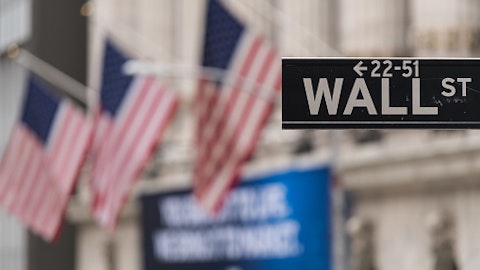In this article, we discuss 5 worst performing S&P 500 stocks in 2023. If you want to read our detailed analysis of the stock market outlook, head over to 20 Worst Performing S&P 500 Stocks in 2023.
5. Newell Brands Inc. (NASDAQ:NWL)
Year-to-Date Share Price Decline: 36.78%
Number of Hedge Fund Holders: 21
Newell Brands Inc. (NASDAQ:NWL) is engaged in manufacturing and commercializing consumer and commercial products worldwide. The company operates through Commercial Solutions, Home Appliances, Home Solutions, Learning and Development, and Outdoor and Recreation segments. The stock price plummeted nearly 37% year-to-date as of June 16, making it one of the worst performing S&P 500 players.
On May 15, Newell Brands Inc. (NASDAQ:NWL) declared a $0.07 per share quarterly dividend, a 69.6% decrease from its prior dividend of $0.23. The dividend was distributed to shareholders on June 15. After posting mixed Q1 results, Newell Brands Inc. (NASDAQ:NWL) expects sales in Q2 2023 to decline between 10% and 14% while normalized EPS is forecasted to range between $0.10 to $0.18. Whereas, Wall Street analysts forecast a decline of 13.24% in revenue and $0.38 in earnings per share during Q2 2023.
According to Insider Monkey’s first quarter database, 21 hedge funds were bullish on Newell Brands Inc. (NASDAQ:NWL), compared to 29 funds in the prior quarter. Richard S. Pzena’s Pzena Investment Management is the largest stakeholder of the company, with 50.8 million shares worth $632 million.
Follow Newell Brands Inc. (NASDAQ:NWL)
Follow Newell Brands Inc. (NASDAQ:NWL)
Receive real-time insider trading and news alerts
4. Zions Bancorporation, National Association (NASDAQ:ZION)
Year-to-Date Share Price Decline: 40.92%
Number of Hedge Fund Holders: 33
Zions Bancorporation, National Association (NASDAQ:ZION) provides corporate banking, commercial banking, commercial real estate banking services, municipal and public finance services, retail banking, trust services, wealth management, and private client banking services. Zions Bancorporation, National Association (NASDAQ:ZION) ranks 4th on our list of the worst performing S&P 500 stocks based on share price performance year-to-date.
On June 15, analyst Timothy Coffey from investment advisory Janney downgraded Zions Bancorporation, National Association (NASDAQ:ZION) to Neutral from Buy after the bank reduced its net interest margin guidance, citing higher deposit costs.
According to Insider Monkey’s first quarter database, 33 hedge funds were bullish on Zions Bancorporation, National Association (NASDAQ:ZION), compared to 38 funds in the preceding quarter. Louis Bacon’s Moore Global Investments is a prominent stakeholder of the company, with 961,246 shares worth $28.7 million.
FMI made the following comment about Zions Bancorporation, National Association (NASDAQ:ZION) in its Q1 2023 investor letter:
“Our two most impacted holdings during this recent crisis were Zions Bancorporation, National Association (NASDAQ:ZION) and discount broker Charles Schwab. We believe both have sticky deposit bases, best-in-class management teams, conservative balance sheets, and attractive valuations. In both cases, outside of absolute contagion/panic resulting in a run on their deposits (a very low probability tail risk), we view the impact on the businesses as more of an “earnings” event, not a “balance sheet” event. Zions and Schwab got caught up in the contagious fear around SVB’s collapse due to some optical similarities between their balance sheets (namely bonds carried at mark-to-market losses), and Zions being a West Coast regional bank. We believe the similarities largely end there. Zions has a much more diverse deposit base than SVB. We estimate that half of Zions’ deposit base are small and medium-sized business operating deposits, which have historically been quite stable and a competitive advantage. Nearly half of Zions’ deposits are FDIC-insured, and the bank has ample liquidity to meet outflows without selling its securities portfolio. Similarly, Schwab’s retail deposit base is very sticky. Over 80% of their customers’ cash is FDIC-insured, and the cash is spread across approximately 34 million brokerage accounts (average ~$10,000 in bank cash per account). Schwab has more balance sheet liquidity than deposits. In both cases, there appears to be a low risk of correlation among their respective client bases. Although there will likely be some profit headwinds that stem from this crisis, we viewed the large declines in these shares as overly punitive, and thus believe the risk/reward for each is increasingly attractive. We have added to both positions.”
Follow Zions Bancorporation National Association (NASDAQ:ZION)
Follow Zions Bancorporation National Association (NASDAQ:ZION)
Receive real-time insider trading and news alerts
3. KeyCorp (NYSE:KEY)
Year-to-Date Share Price Decline: 43.61%
Number of Hedge Fund Holders: 34
KeyCorp (NYSE:KEY) was founded in 1849 and is headquartered in Cleveland, Ohio. It is the holding company for KeyBank National Association, providing retail and commercial banking products and services in the United States. As of June 16, KeyCorp (NYSE:KEY) stock plummeted nearly 44% year-to-date, categorizing it as one of the worst performing S&P 500 members.
On April 20, KeyCorp (NYSE:KEY) reported a Q1 GAAP EPS of $0.30 and a revenue of $1.71 billion, missing Wall Street estimates by $0.14 and $90 million, respectively.
According to Insider Monkey’s first quarter database, 34 hedge funds were bullish on KeyCorp (NYSE:KEY), compared to 33 funds in the prior quarter. Phill Gross and Robert Atchinson’s Adage Capital Management is the largest stakeholder of the company, with 16.6 million shares worth $209 million.
Follow Keycorp W (NYSE:KEY)
Follow Keycorp W (NYSE:KEY)
Receive real-time insider trading and news alerts
2. DISH Network Corporation (NASDAQ:DISH)
Year-to-Date Share Price Decline: 54.11%
Number of Hedge Fund Holders: 35
DISH Network Corporation (NASDAQ:DISH) provides pay-TV services in the United States. On May 8, DISH Network Corporation (NASDAQ:DISH) reported a Q1 GAAP EPS of $0.35 and a revenue of $3.96 billion, falling short of Wall Street consensus by $0.04 and $100 million, respectively. In the first quarter of 2023, there was a reduction of around 552,000 pay-TV subscribers for Pay-TVNet, compared to the decrease of approximately 462,000 subscribers in Q1 2022. DISH Network Corporation (NASDAQ:DISH) stock has plummeted by 54% year-to-date as of June 16, making it one of the worst performing S&P stocks.
On June 6, Benchmark downgraded DISH Network Corporation (NASDAQ:DISH) stock to Hold from Buy with a $7.30 price target. Benchmark analysts observed that rumors of a potential partnership between Dish and Amazon for discounted or free wireless services for Prime customers reflect the perceived potential of Dish’s network but have been denied by Amazon and major mobile network operators.
According to Insider Monkey’s first quarter database, 35 hedge funds were long DISH Network Corporation (NASDAQ:DISH), compared to 37 funds in the prior quarter. Boykin Curry’s Eagle Capital Management is the largest position holder in the company, with nearly 15 million shares worth $139.6 million.
Here is what ClearBridge Investments has to say about DISH Network Corporation (NASDAQ:DISH) in its Q2 2021 investor letter:
“Portfolio holdings in the communication services and financial sectors also made strong contributions. Dish Network continues to make progress on the buildout of its greenfield 5G network, with Las Vegas slated to become the first market launched later this year. The company gained credibility, and its stock reacted favorably, after it announced a partnership with Amazon to deploy a 5G cloud-native network using AWS’s cloud infrastructure. While the stock has been volatile in recent quarters, we continue to feel confident in Dish’s long-term prospects, which include competing as a fourth U.S. wireless carrier. Charter Communications has been executing well and benefiting from the growth in residential broadband, which has been accelerated by COVID-19 and should see further support from the Biden Administration’s infrastructure bill, which earmarks $65 billion for broadband buildout. In addition, we expect the company to continue to grow its wireless business, leveraging its mobile virtual network operator (MVNO) relationship with Verizon. The company continues to generate strong and growing free cash flow and deploys it toward consistent and material share buybacks.”
Follow Dish Network Corp (NASDAQ:DISH)
Follow Dish Network Corp (NASDAQ:DISH)
Receive real-time insider trading and news alerts
1. Advance Auto Parts, Inc. (NYSE:AAP)
Year-to-Date Share Price Decline: 54.32%
Number of Hedge Fund Holders: 38
Advance Auto Parts, Inc. (NYSE:AAP) provides automotive replacement parts, accessories, batteries, and maintenance services. The company was founded in 1929 and is based in Raleigh, North Carolina. Advance Auto Parts, Inc. (NYSE:AAP) is one of the worst performing S&P 500 stocks as of June 16, given the share price has nosedived 54.32% year-to-date.
On May 31, Advance Auto Parts, Inc. (NYSE:AAP) declared a $0.25 per share quarterly dividend, a 83.3% decrease from its prior dividend of $1.50. The dividend is payable on July 28, to shareholders of record on July 14. The company slashed its quarterly dividend by 83% to achieve higher financial flexibility.
According to Insider Monkey’s first quarter database, 38 hedge funds held stakes worth $584.6 million in Advance Auto Parts, Inc. (NYSE:AAP), compared to 39 funds in the prior quarter worth $722.2 million.
Here is what Heartland Advisors specifically said about Advance Auto Parts, Inc. (NYSE:AAP) in its Q3 2022 investor letter:
“We also found an opportunity to add to our existing position in Advance Auto Parts, Inc. (NYSE:AAP) as the stock fell and the risk/reward profile improved. Advance underperformed early in the quarter as lower-quality sector peers bounced significantly. In August, shares fell further after the company reported second quarter earnings that disappointed because of weakerthan-expected same-store sales. Furthermore, management reduced its full-year earnings outlook by ~4%, citing softening consumer purchasing patterns within AAP’s “do-it-yourself” business.
The most important driver of Advance Auto’s earnings power seems to be the management team’s ability to improve margin expansion. However, the market remains myopically focused on sales growth. The margin expansion opportunity originates from the consolidation of an overly complex and inefficient distribution network. Management is planning to roll out new distribution center. software through 2023 that will reduce costs, improve network productivity, and enhance customer experience through better inventory availability.
In addition, the auto parts retailing industry tends to be less cyclical than the Consumer Discretionary sector because consumers often hold onto their used cars longer and make necessary repairs rather than buy new vehicles when their financial prospects are weakened. AAP is currently trading at less than 12 times forward earnings, well below the company’s long-term median P/E of more than 15—while having significant room to improve profitability owing to its self-help initiatives.”
Follow Advance Auto Parts Inc (NYSE:AAP)
Follow Advance Auto Parts Inc (NYSE:AAP)
Receive real-time insider trading and news alerts
Insider Monkey focuses on uncovering the best investment ideas of hedge funds and insiders. Please subscribe to our free daily enewsletter to get the latest investment ideas from hedge funds’ investor letters by entering your email address below. You can also check out 50 Largest Economies in the World in 2023 and 12 Largest Barite Producing Countries in the World.





